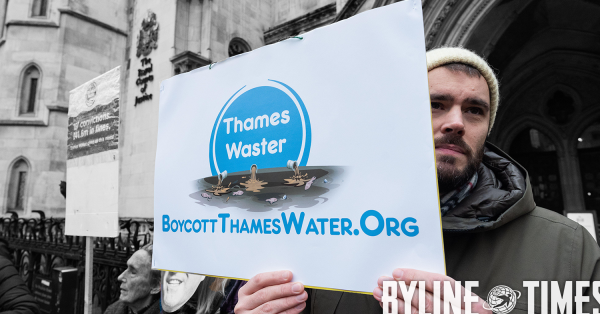Byline Times is an independent, reader-funded investigative newspaper, outside of the system of the established press, reporting on ‘what the papers don’t say’ – without fear or favour.
To support its work, subscribe to the monthly Byline Times print edition, packed with exclusive investigations, news, and analysis.
Thames Water’s preferred investor KKR, previously signed a deal to manage the US municipal water company of Bayonne New Jersey which “sent bills soaring” and has been described by residents of the city as “drowning us”.
On Monday Thames Water, the UK’s biggest water supplier, which has been struggling under mounting debt, announced the American private equity firm KKR as its preferred buyer in a bid to prevent nationalisation. KKR is expected to acquire a stake of around £4 billion in Thames Water.
While KKR has some experience managing water companies, both in the UK and the US, the company has not always left customers happy.
In 2012, the New Jersey city of Bayonne signed a deal with KKR and Suez to manage their municipal water system which was in dire need of repairs to its crumbling infrastructure.
In 2016, the New York Times reported that “those crusty brown pipes have been replaced by shiny cobalt-blue ones” but this came “with a hefty price tag — not just to pay for new pipes, but also to help the investors earn a nice return”.
The deal the financially desperate city signed with KKR and Suez guaranteed the company a return of over half a billion dollars over 40 years. However, water rates rose 28% between the signing of the deal in 2012 and 2016 and continued to rise afterwards. The deal promised residents a four year freeze on water rates, which never materialised because of the revenue guarantee.
KKR sold its share in Bayonne’s water company to Argo in 2018, making a return of 2.8 times the amount invested, though the deal signed alongside Suez remains in place.
ENJOYING THIS ARTICLE? HELP US TO PRODUCE MORE
Receive the monthly Byline Times newspaper and help to support fearless, independent journalism that breaks stories, shapes the agenda and holds power to account.
We’re not funded by a billionaire oligarch or an offshore hedge-fund. We rely on our readers to fund our journalism. If you like what we do, please subscribe.
The company also has a record of overseeing price rises, and allegations of sewage dumping in the UK.
At Prime Minister’s Question Time on Wednesday Liberal Democrat leader Ed Davey criticised Kier Starmer’s refusal to bring Thames Water into special administration by while raising KKR’s previous investment in Northumbrian Water.
He said “three years ago the American private equity firm KKR bought a 25% stake in Northumbrian Water, since then people across the North East have seen their water bills soar, while last year alone Northumbrian Water has dumped nearly one million tonnes of raw sewage in to Durham’s Whitburn coast conservation area”.
Davey asked if Starmer would guarantee that Thames Water would not be allowed “to pull the same trick of raising bills and dumping raw sewage at the same time”.
Mathhew Topham of the campaign group We Own It told Byline Times “KKR inspired a book and film called Barbarians at the Gate precisely because of its rampant profiteering and financial abuse of service users so we know that it is completely ill suited to delivering a public service that works in the interests of its users and the environment”.
KKR claims to have moved beyond its asset stripping past. In a 2019 Forbes article titled “Gentleman at the Gate” Henry Kravis one of the co-founders stated “You can’t buy a company and strip out all the costs. It’s not a sustainable business model […] “If you’re not putting money back in to come up with new products, new plants and new ways of doing business in new geographies, you’ll die eventually”.
In July last year KKR bought FibreCop from Telecom Italia, the major Italian telecoms network. In September 2024, Fibrecop announced that they were cutting 1300 jobs through a voluntary redundancy scheme.
In January the CEO of Fibrecop Luigi Ferraris quit the company with no explanation given by Fibrecop following a “tense” board meeting in which the CFO disclosed that 2025 pre-tax earnings would be €449m lower than initially forecasted in KKR’s original business plan.
The financial situation of Fibrecop under KKR’s tenure has Italian trade unions worried. Daniele Carchidi of SCL CGIL, the Italian communication workers union told Byline Times that Ferraris quit due “to a contrast in perspectives with KKR” and that when KKR bought the company it “was expected to result in a series of investments in new technologies and widespread coverage of fibre optics and therefore a three year postponement for the first dividends, but apparently KKR has no intention of waiting three years for profit distribution”.
He added that among the unions “the concern is starting to increase, considering the reasons for the CEO’s resignation and the rumours of redundancies”.
Topham told Byline Times that references to “Gentleman at the Gate” and a changed KKR were “just boilerplate stuff that they put on over the same model. It has literally not changed for 40 years. Because of how the legal corporation is structured, because of how the regulatory system is structured, they just have to prioritise returns to shareholders and to capital more widely over the interests of service users”.
Byline Times asked Thames Water if KKR had given them assurances about job cuts and proposed a deal that would be fair to the consumer. Thames Water suggested Byline Times direct those questions towards KKR. KKR in turn did not respond to a request for comment.
Asked if they thought KKR was an appropriate buyer, a UK Government spokesperson said, “The company remains stable and the government is closely monitoring the situation. It would be inappropriate to comment further on the financial matters of a private company.”
Olly Haynes is a freelance journalist with Byline Times.



